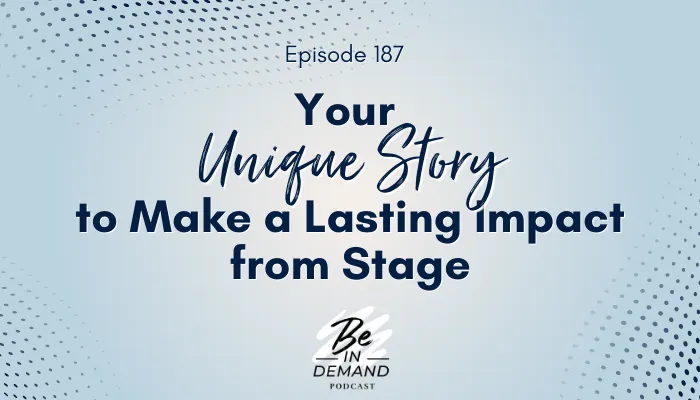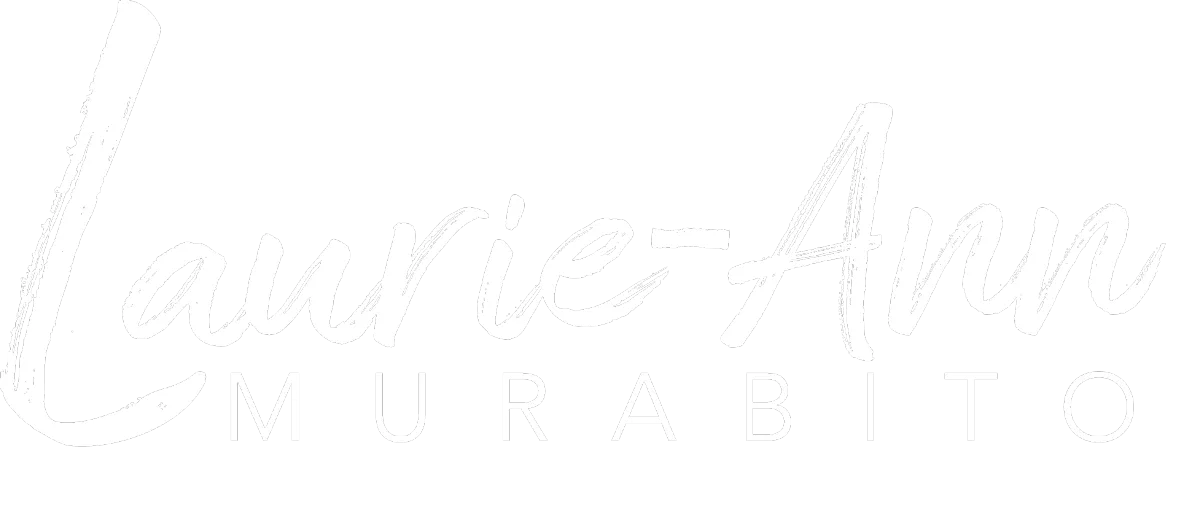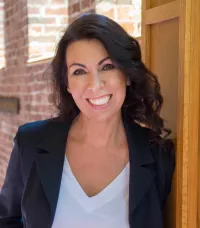Episodes

Your Unique Story to Make a Lasting Impact from Stage | Ep 187
“Stories help your listener see themselves in your story.” - Laurie-Ann Murabito
Uncover the power of your personal story to grow your business and make an impact.
In this week's episode uncover why your unique story and perspective is your secret weapon. You might feel your story is too "common” and may not matter. Don’t discount sharing an incredibly impactful personal story with more people.
Your story can never be used by another. Sharing your perspective and journey gives others inspiration.
Learn how Laurie-Ann found the courage to share her story of love, loss and reinvention has allowed her to connect with audiences and drive more business.
Check out what you’ll learn:
Look back at pivotal moments and obstacles in your life - these shape your distinctive viewpoint and will help you sound truely unique and memorable.
If a story still feels too raw, wait until you are ready before sharing publicly.
Remember that relatability, not extremity, is key for audience connection, so you don;t need to feel you have to hike Mt. Everest for a good story.
Learn techniques to share your story and inspire action, and you’ll sound like yourself always.
Speaking up helps you connect with the audience so you can step off the stage to spin-off business and referrals.
If you've been holding back out of fear or doubts, this episode will give you the motivation and strategies to embrace the power of your personal story.
Resources mentioned in this episode:
Learn more about IN Demand Signature Speech TODAY!
Grab the FREE resource Go from Unknown to Visible.
Grab the FREE resource Take the Stage
Follow me on Instagram: @laurieann.murabito
For more about me and what I do, check out my website.
If you’re looking for support to grow your business faster, be positioned as an authority in your industry, and impact the masses, schedule a call to explore if you’d be a good fit for one of my coaching programs.
Transcript:
Laurie-Ann Murabito [00:00:03]:
Welcome back to another episode. Today, we are going to talk about your story. You know, that story that you don't want to tell. That story that you keep second guessing. Well, I'm going to share with you one of my stories that I have been telling on stage, and I'll tell you exactly why that happened. So let's get on to the show. Before we dive in, let's just talk about your story, and why it's so important to tell your story. The number one thing is that nobody can tell your story the way you can tell your story.
Laurie-Ann Murabito [00:00:40]:
Nobody can tell Your story from your perspective. You know, it may be something that's everyday ish, and lots of people have gone through this whether it's It's a divorce, a loss of a child, raising, you know, a neurodivergent child, Leaving corporate, whatever your story is, even if it's very common, let's just take it's very common for for starters. Nobody has your perspective. Nobody went through your experience, and it's your experience, and the way that you're going to share your story that other people will learn from. So that's number 1. You know, like and I also want to address the point of the everyday story, because those everyday stories are actually so relatable. There's so many people that are in your audience who will be able to relate to your story. They're like, Oh, I have neurodivergent child.
Laurie-Ann Murabito [00:01:39]:
Oh, yeah. Like, I got divorced at a young age or at an older age. You know, I married my high school sweetheart. I left corporate because my job got eliminated. Even the common story is so relatable because there's gonna be so many people that are in your audience be like, oh, she gets me. He understands what I went through. You know you do not, and you've probably heard me say this before, but you don't have to have climbed Mount Everest. Because climbing Mount Everest, as amazing as it is, And there's so many lessons that are in there.
Laurie-Ann Murabito [00:02:16]:
Not many people can relate to that. And what I mean by that is the people that are in your audience, Your followers, they can't relate to that. So talking about your journey, your unique journey. Even if you've been journaling it, like, go back through your journal and just see some of the hurdles that you've overcome. Notice some of the themes. You know, how did you work through something? What was your mindset around it. How did you think about it? How did you finally go around that wall You separate the girls from the women, and the boys from the men. You know, those walls Are there to see how bad do you want what's on the other side.
Laurie-Ann Murabito [00:03:05]:
So sometimes you gotta get creative. Sometimes you gotta walk around the wall, Underneath the wall, climb the wall, scale the wall, get a helicopter to get you to the other side of the wall. You know? But that wall, that's a story. So what's your wall? What's the wall that's in the way on your path. So just think about that. What's that story that you haven't been talking about? Now when I say that you haven't been talking about, you want to make sure that it's not a story that's still painful. Like, if you were up in front of people, if you were going to start to get teary eyed and cry, That's you're not ready to tell that story. You might one day be able to tell that story.
Laurie-Ann Murabito [00:03:57]:
And as a matter of fact, I was talking to a friend of mine. She is a speaker, and she is a cancer survivor. And we were talking about her story, like how she, Like, approached her business, how her business thrived, how she changed some of her health because of the cancer. But she's not ready to tell that story yet on stage. So we just kinda like, let's just set that aside until You're ready to tell that story. We'll figure out the lessons and how it can relate to your niche, and how you can share with the audience. Here's the lessons that you want them to take away, but only until you are ready to tell the story. So years ago, when I first started getting into into speaking.
Laurie-Ann Murabito [00:04:47]:
And this conversation stopped me from telling my story in any way, shape, or form. I just completely dismissed it. So if you've been dismissing a story, I just want you to know that even me, even myself, the Professional speaker who you know, like, I'm a big advocate about stories and the lessons, and how the audience like, how we need to share that with the audience. Even I judged my own story. And because I did it for so long, it's like It's not a part of who I am, but actually it is a part of who I am. So years ago, I'm starting off with National Speakers Association, And I want to get into public speaking, and make a business of this, and I remember going to this weekend conference hosted right here in Boston. And I went up to get some coffee during one of the breaks. And this woman, who obviously, a seasoned member of National Speakers Association, turns to me and you know, like, we chitchatted like we exchanged names.
Laurie-Ann Murabito [00:05:52]:
She must have asked me, Well, what do you speak on? I think I and I'm pretty sure that I said, I don't know yet. And she told me what she spoke on because now I'm getting curious about her and her journey. And she said, what's your story? And I give her the cliff notes to my story, meaning, like because I I was answering the question of, like, well, who are you? What brought you here? And she looked at me and said, You'll never make any money with that. It's already been done. And she pivoted and walked away. Me being so new, I believed her, and I was like, oh my god. That story, that this part of me isn't good enough. I have got to search for something that will be good enough.
Laurie-Ann Murabito [00:06:42]:
You know, and it took me a long time to realize that I gave that woman in that moment way too much power. So I'm sharing that with you. If you have something similar where somebody gave you their opinion, their perspective because she had no idea what I was gonna be speaking on. She had no idea how I would even be using that story. She had no idea what my perspective and how I journeyed through that story. She had no idea, and I gave her too much power. So then I go into leadership, and I'm just like, that story has nothing to do with leadership, and it had everything to do with leadership. That story had nothing to do with corporate engagement because these are the topics that I used to speak on.
Laurie-Ann Murabito [00:07:29]:
And, actually, it had everything to do with corporate engagement. But, again, I just kinda dismissed it. I pushed it aside. Pushed it aside. And then, you know, I come into the online space and I'm teaching people, like, how to use and leverage speaking opportunities. How to write and deliver amazing speeches and tell amazing stories. And I still dismissed it because Now it's just something that I pushed aside. And only in the past, I would say 9 months, Have I realized I need to tell this story? And I have started to tell this story, and I'm gonna give you probably have not heard this story, so I'm gonna give you the cliff notes.
Laurie-Ann Murabito [00:08:15]:
You know, in my thirties, I met the man of my dreams, the man that I was preparing for. Literally, because when I met him, I was like, this is the person that I'm supposed to be with. And we dated for a couple of years, And he proposed. I said yes. And in a in a 11 month period, I went from being a girlfriend to a fiance to a wife to a widow. I lost my husband. We were married for 8 months, together for two and a half years, and I found myself a widow at the age of 36. But part of the leadership story was how I put my life together, how I put it back together, How I recreated myself, but also how I navigated health care because he died of the Indiscriminate disease, cancer.
Laurie-Ann Murabito [00:09:28]:
And through that journey of dealing with health care, doctors, systems. I was actually leading a group of people that didn't even know that they were on the same team. They didn't even know that they were part of the same department, basically. And that was something that I was able to do. So, like, really, this is a story that I should have been telling when I was in leadership. This is a story that I should have been telling in corporate engagement speeches. And I share this story now, and I share a little bit more of it. I just kinda like gave you the cliff cliff notes.
Laurie-Ann Murabito [00:10:08]:
But I share it because everybody has a story. Your story makes you uniquely you. And the story that I used to tell when I was in leadership was about this little girl and a and a dad going shopping for a jackknife, A Swiss army knife, and I tell that story, and I got known for that story. Like, I would be in the hallways at conference centers. People would see me and say, you're Lorraine. Are you gonna tell that Jackknife story? And if you're like, yes, actually I am. Are you gonna do, you know, there's this other ball, exercise that I've done before. If you go over my YouTube channel, you can find this funny ball exercise.
Laurie-Ann Murabito [00:10:55]:
But you get known for stuff. I could have been getting known for this story, because nobody nobody can tell That story. Nobody can tell my story. Nobody can steal my story and tell it the way that I tell my story. And I'm reminding you that nobody can tell your story. Your eyes, your journey, every step of the way, Only you can tell that journey. That's your story, and the people that are in the audience are going to be on the edge of their seats listening to your story, especially when you learn to tell a story in a way that captivates an audience. Storytelling is also to help the audience overcome objections.
Laurie-Ann Murabito [00:11:44]:
The objections that they're thinking about, That they're feeling, that they're believing about themselves or their industry or their customers. That's what your stories are also for. They're your stories are to help the audience imagine themselves in your story. So you are taking them on a journey to help them get from point a to point b. That way at the end of your presentation, You want what I call spin off business. You want people to be raising their hands saying, I need to book a call with you. I need to sign up for that program. I want that lead magnet.
Laurie-Ann Murabito [00:12:22]:
I also am on the committee for and they'll there's another speech there. My goal for all of my clients is that you step off the stage, and you have at least 2 referrals to 2 other places to speak. And then those 2 places become 2 more, and 2 more. I mean, I'm not even talking about the number of clients that you are going to sign on. You know, as a matter of fact, just speaking just taking a little tangent here. Speaking of signing up clients, I had a client who that I worked with. We we work together as an intensive, and what that is is that's either a 90 or a 3 hour session. And I helped her craft her presentation because she had a presentation that was coming up rather rapidly.
Laurie-Ann Murabito [00:13:12]:
And so she gave that presentation, And there was a woman who was not on the live not in the live sessions. She this was a virtual event. It was actually somebody who watched the replay, Booked a call with her, and that woman showed up on that call ready to hire her. That's what happens when you speak. So a lot of those people that are in your audience who raised their hand to, I want to Book a call with you. I wanna learn more about your services. I wanna learn more about your programs. They are going to show up on the calls prequalified.
Laurie-Ann Murabito [00:13:50]:
That's just kinda what happens. And you've heard me talk so much about this, so I won't go into this into any more of that today because this is really about your story, the story that you're holding back, the story that Your judging is not good enough. What will the audience think? Because that was part of the reason why I didn't talk about my My journey through grief and widowhood and what had happened was because I didn't want people to label me as some grief speaker. Because I was in leadership and corporate engagement, but I was also very new back then. And I just like think back now, even my personal development, my own personal development, that Journey has really allowed me to embrace who I am, and a lot of my friends who are speakers, who have seen me speak now, they're just like, Wow. You know, like, You have gotten really, really good, and there's a lot of reasons for that. I really work at my craft, whether it's in person or whether it's virtually. So what story are you holding back? I wanna encourage you to actually start telling that story.
Laurie-Ann Murabito [00:15:10]:
If, here's the caveat, if you are ready to tell that story. If it's still very painful, then right now is not the time. And if you are ready to start telling your story, if you want to learn more about my programs, and how you can work with me either in a group setting or 1 on 1, Book a call with me, that link is going to be down below, but if you're just listening to this or you're watching this on YouTube, you can go to chatwithla.com, and then I'll take you to my booking link. And we will discuss your goals, your business, and your story, and I will help you decide between the different programs that I have in the different ways to work with me, whether it's a Short time intensive, more long term 1 on 1, or any one of my group programs. I always want to help you be in the right program, to be able to tell your story, to write a speech that gets you business, and more spin off business, and into other other conferences being referred. I want you To have a compelling and captivating presentation, and most importantly converting. And I want your audience to be Raving about you, remembering you, and referring you to other people and meeting planners. So if you have any questions, I would love to hear what your story is.
Laurie-Ann Murabito [00:16:37]:
Feel free to go over to Instagram. Send me a DM. Let's continue this conversation about your story, and hop into my DMs and tell me more about Your story about the story that you want to be sharing in front of others. Your story that you want to make a bigger impact with. The story you want to tell from stage. So until next time, be in demand.







